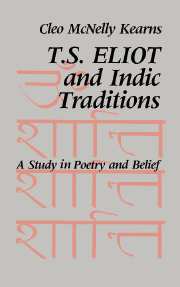5 - Religious Points Of View
Published online by Cambridge University Press: 07 October 2011
Summary
It takes perhaps a lifetime merely to realise that men like the forest sages, and the desert sages, and finally the Victorines and John of the Cross and (in his fashion) Ignatius really mean what they say. Only those have the right to talk of discipline who have looked into the Abyss.
T. S. EliotWhat these writers aim at, in their various idioms, in whatever language or in terms of whatever religion, is the Love of God. They gave their lives to this, and their destination is not one which we can reach any quicker than they did or without the same tireless activity and tireless passivity.
T. S. EliotIF ELIOT ADMITTED to experiencing difficulties and confusion in his approach to the “mazes” of Indic religions, he also indicated their profound attractions. He spoke of their “heart,” their “mystery,” and their “hope,” and as we have seen, his reasons for drawing back from them were essentially practical rather than intellectual (ASG 40–41). In his early years he was reacting against the attenuated religious beliefs of his family – to his mind, hardly even Christian but expressing merely a kind of universal piety1 – and any system that seemed rigorous and disciplined had its appeal. When to that rigor and discipline was added the challenge, the difference, of a point of view based on radically new assumptions, the appeal was even greater. Indic religion, particularly Buddhism, seemed for a time to promise that saving difference.
By 1927, as we know, Eliot had made a decision that took him less in the direction of the Buddhist Middle Way than in that of the via media of the Anglican church.
- Type
- Chapter
- Information
- T. S. Eliot and Indic TraditionsA Study in Poetry and Belief, pp. 131 - 159Publisher: Cambridge University PressPrint publication year: 1987



